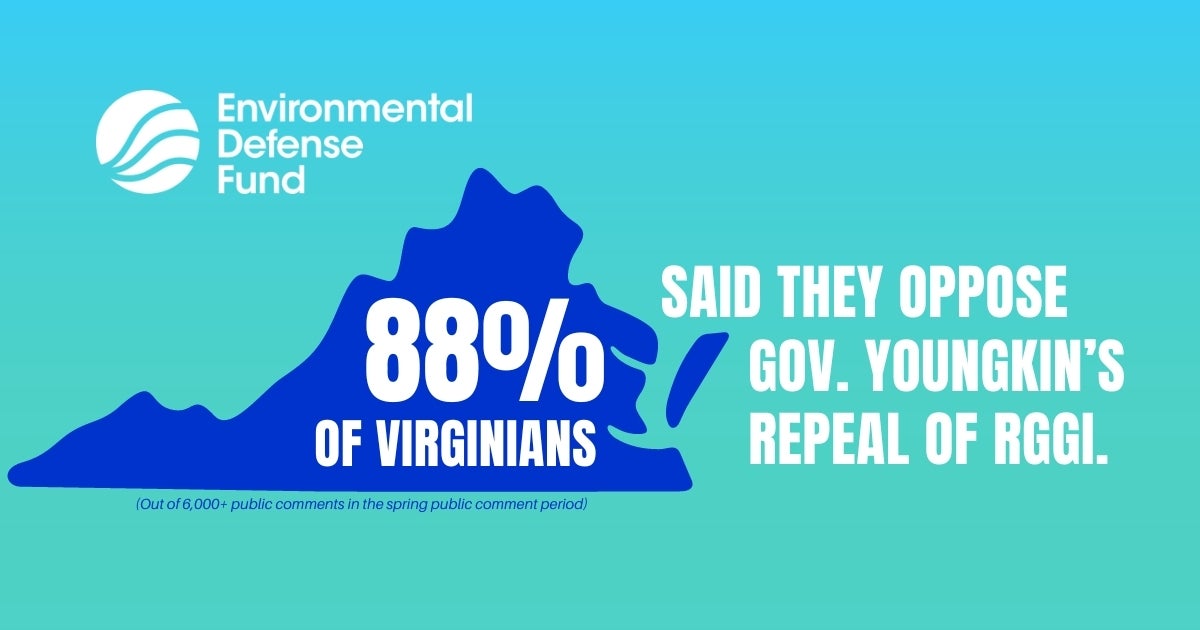
Governor Youngkin’s RGGI rollback is wrongheaded and unpopular
Since joining the Regional Greenhouse Gas Initiative (RGGI) in 2020, Virginia has started capping harmful pollution from power plants, growing clean energy jobs across the state and providing more than $500 million in investments for flood resilience in communities and money-saving energy efficiency in households.
But since his first day in office, Governor Youngkin has been determined to pull Virginia out of this proven climate program that has been implemented by Democrat and Republican governors alike.
The administration’s rollback threatens progress right as the threats from climate change – and opportunities from clean energy investment – are clearer than ever for the Commonwealth.
Virginia’s Air Pollution Control Board voted in favor of continuing with the withdrawal, moving the process forward, but two major roadblocks continue to stand in the way: The overwhelming majority of Virginians said they oppose the repeal, and neither the Youngkin administration’s Air Pollution Control Board nor Department of Environmental Quality has the legal authority to exit the program.
The most recent steps in the RGGI repeal process shine a spotlight on how misguided and out-of-touch the administration’s climate rollback is.
Virginians strongly oppose leaving RGGI
As part of the withdrawal process, the Youngkin administration opened comment periods for the public to weigh in on its decision – the most recent one closed at the end of March.
The answer was decisive: Of the more than 6,000 comments submitted regarding potential RGGI withdrawal, 88% of Virginians said they opposed Virginia leaving the program. And not a single person at the public hearing last month sided with the administration. This opposition builds on strong pushback from the fall comment period, when 95% of Virginians said they wanted to stay in RGGI.
Faith leaders, mayors, doctors, youth, parents, business leaders and many others told the Youngkin administration they support RGGI because it brings real benefits to their lives.
Many of the public comments submitted and statements given at the public hearing stressed the importance of the proceeds from RGGI auctions, 45% of which is set aside for flood resilience projects through the Community Flood Preparedness Fund (CFPF) grant program. As a local conservation group in Fredericksburg urged in a public comment, “If repealed, the only source of funding for the CFPF will disappear leaving localities without a major source of funding for flood resilience.” The other portion of RGGI proceeds to fund energy efficiency in low-income households that bear the greatest energy burden. For example,12 homes on the Eastern Shore that received RGGI funding for weatherization and other heating and cooling issues saw their utility bills drop 20% — alleviating the very energy burden the administration cites as a reason to withdraw.
Progress on cutting carbon and air pollution is on the line, too. As a doctor explained, “Pollution should not be free. The damage it causes should be recognized and compensated. This is what RGGI does, and it is a successful program.” Contradicting its own statements about RGGI’s track record, a report from the Youngkin administration acknowledged that carbon pollution has “decreased in RGGI participating states by 59%.”
Many Virginians aren’t buying the administration’s argument that RGGI is costly either. They can see for themselves how the cost of natural gas is to blame for their high electricity bills: “Continuing our dependence on increasingly volatile fossil fuels like natural gas are only going to make the problem worse,” expressed another Virginia resident.
Furthermore, Gov Youngkin should heed the calls of businesses across Virginia who voiced their opposition. As Ceres, an organization that works with major institutional investors and companies, puts it: “It is critical that RGGI and Virginia’s other climate and clean energy programs persist to ensure both the state and the business community achieve their shared goals of driving new in-state investment, encouraging innovation, and fostering long-term economic health.”
The bottom line: Gov. Youngkin is making the wrong choice by going through with the exit when Virginians have made their opposition loud and clear.
The Administration lacks the authority to exit RGGI
The other major roadblock to the withdrawal is the fact that the administration lacks the legal authority to remove Virginia from RGGI.
In December, when Virginia’s Air Pollution Control Board voted in favor of regulations that would withdraw the state from RGGI, two members of the board abstained from the vote on the basis that the body did not have the legal authority to remove Virginia from RGGI.
Many groups, as well as many Virginians in public comments, have also continued to point out that the governor does not have the authority to pull out of the program unilaterally. That is because when the General Assembly enacted the Virginia Clean Energy and Community Flood Preparedness Act in 2020, it also ratified Virginia’s RGGI regulation. Therefore, the agencies’ authority and actions are bound by Virginia’s statutory requirements — requirements that only both houses of the General Assembly and the governor, acting in concert, may alter.
However, efforts to do so in the legislature have failed, again reflecting the will of the majority of Virginians.
The Youngkin administration has indicated it wants Virginia out of RGGI by the end of 2023, but poor reception in the repeal process so far firmly underscores that barreling ahead is wrongheaded, unpopular and harmful for Virginia communities.
Rather than unlawfully rolling back a program that is already delivering substantial benefits for the state, the Youngkin administration should be building on RGGI’s successes to move Virginia further along the path to a prosperous, clean energy future.














